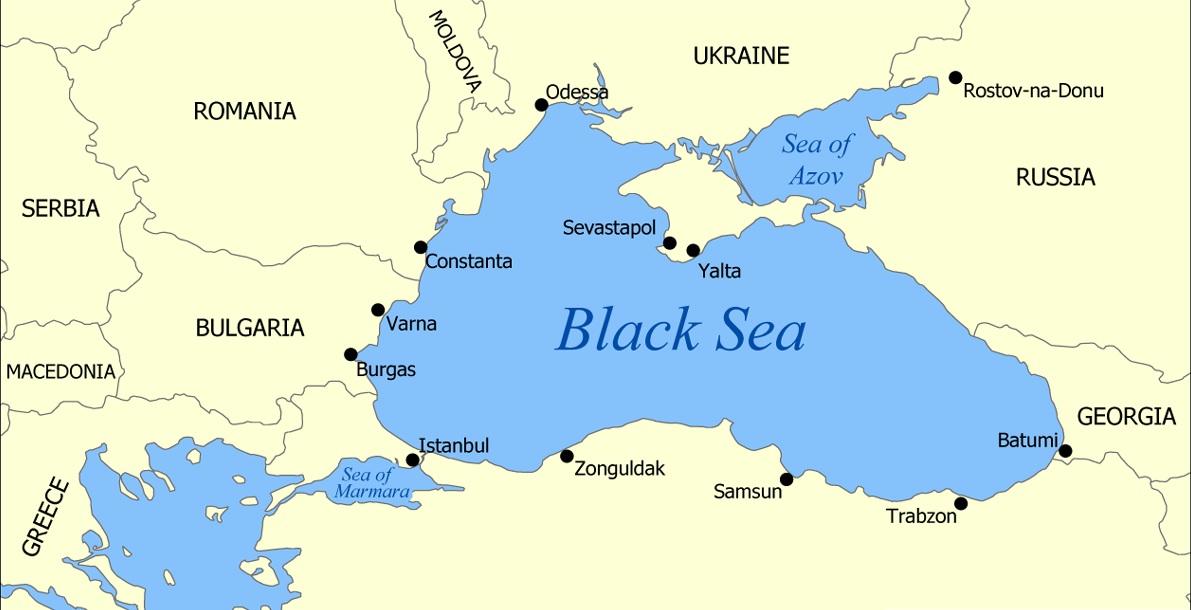Last year, the events taking place in the Black Sea region have repeatedly attracted the attention of the world community. For the Russian Federation this region, both in the short and long term, remains a strategically important buffer zone and at the same time a communication bridge connecting East and West.
It should be emphasized that Russia is interested in protecting its southern borders, however, NATO’s expansion to the East and the regularity of military exercises on the line of contact with Russia have led to the increasing militarization near the borders of the Russian Federation and, accordingly, an exaggeration in conflict potential. This, in turn, correlates with traditional and new security threats arising in the Black Sea region which consists of numerous crucial logistics routes. In recent years, one could witness the «unfreezing» of several seemingly long-frozen conflicts.
In their latent form, they pose a real threat to regional security, both politically and energetically. In the first case – due to the complexity of the interaction of actors, in case of energy security – due to the difference in economic and political benefits of the pipeline network. They give advantage to some countries at the expense of others while risking to leave direct consumers without energy resources. Additionally, the possibility of the Nord Streams’ scenario development in the Black Sea currently adds a lot to the geopolitical ambience.
For example, in the Nagorno-Karabakh conflict, the increased regional role of Baku arising from the Baku-Tbilisi-Ceyhan pipeline and close cooperation with Turkey, allowed Azerbaijan to increase investment in military capacity [1]. This reflected in the escalation of the old conflict in 2020, when Azerbaijan demonstrated the ability to successfully use unmanned aerial vehicles and targeted strikes to destroy enemy forces. Azerbaijan actively purchased UAVs in Turkey and Israel and even organized joint production [2]. Armenia, in turn, was not equally prepared, which led to an underestimation of threats and the following changes in the balance of power.
According to political scientist Sergei Markedonov and British expert on the Caucasus Thomas de Waal, during the war, Azerbaijan managed to significantly change the situation in its favour, which was also reflected in the signed agreement [3]. The Second Nagorno-Karabakh War showed the strategic importance of air superiority in modern warfare. Moreover, it became a crucial indicator of the need to resolve the issue of the use of new types of conventional weapons on the regional level. The non-viability of the CFE Treaty as a result of Western countries’ refusal to ratify it, the Russian moratorium, the absence of an Adapted Agreement [4], as well as the waves of NATO expansion, further complicated the balance of power. This has led to the fact that, as of 2023, no international treaty regulates the state of conventional armed forces in Europe and in the Black Sea region as well, as far as it is an integral part of European security space.
The transport blockade of Nagorno-Karabakh that began in December 2022 and still in force as for February 2023, accompanied by the gas supply cut off by Azerbaijani side, is another indicator of instability in the region.
Along with the weakening Russia’s influence and its authority in Armenia, the conflict may again escalate, because judging by the latest actions, now the Armenian perception is based on the fact that Russian peacekeepers are inactive and the CSTO has lost its effectiveness. A new wave of escalation would be extremely undesirable for the Russian Federation and would undermine the already fragile architecture of the Black Sea region security.
Its vulnerability became clearly visible after the outbreak of the Ukrainian crisis of 2014, which turned into ashes the idea of integrating Russia into the Western community. The exponentially worsening relations between Russia and the West have turned a former partnership into animosity. In February 2022, the hybrid war acquired a military dimension, opposing interests were replaced, albeit indirectly, but still by confrontation with NATO. The break has become a fact [5].
Obviously, Ukraine became the stumbling block in many dimensions of NATO-Russia relations, and undermined the basic achievements of the post-Cold War years. Currently the active phase of the conflict poses threats not only for the national security of the Russian Federation but to the whole European security architecture. As has been recently discussed during the roundtables of Royal United Services Institute for Defence and Security Studies (RUSI) – the future of European security is dependent on how the war on the ground in Ukraine ends. According to the RUSI Conference Report, the allied forces supporting Ukraine are likely to win the war. The best-case scenario would be that a future Russia would wish to buy into a rebuilt collective security system. The worst-case scenario would be that Russia turns inwards and continues an aggressive and isolated path, and a North Korea-type scenario develops. [6] The confrontation with Russia remains a long-term struggle. All NATO nations, individually and collectively, is said in the report, need to understand that there is no return even to the 23 February 2022 security relationship with Russia. And if for example, for Russia the issue of Crimea was closed already in 2014 and is not the subject for discussion during the current crisis, then for the Western countries the status of Crimea is fundamental to the security future of both Russia and Ukraine and cannot be treated separately.
In this regard, it is worth mentioning the Transnistria conflict, which in the period from 2014 to 2022 was perhaps one of the least significant factors that influenced the growth of insecurity in the Black Sea region. However, armed provocations in the summer of 2022 could be used with subtle geopolitical calculations and were intended to influence the course of the Ukrainian conflict. In this situation, the West is extremely interested in opening a «second front». According to this scenario, Russia would be forced to transfer part of its forces and assets to Transnistria, thereby easing pressure on the Armed Forces of Ukraine in their southeast direction. Moreover, such a scenario would involve even more parties.
According to RUSI experts, the general Western understanding of European security after the end of World War II was based on transatlanticism, the presence of the United States and its «security umbrella». For this reason, the Ukrainian conflict is of the key importance because of its scope, because of how it will set new standards for European security [7].
In such a difficult situation, the only possible way to regulate the behavior of actors and establish new norms is the implementation of effective international regimes. For the security architecture of the Black Sea region, these are the maritime and arms control regimes. And if the maritime regime of the Black Sea, in principle, works properly, then in the case of the latter, there are two «bricks of concern»: nuclear and conventional arms control.
Analyzing regional security through the prism of the nuclear arms control regime, it is worth noting that the main concern is already deployed systems. Thus, the termination of the INF Treaty led to heightened controversy over the operation of Aegis Ashore and increased the likelihood of new missiles appearing in the region (as has already happened with the deployment of systems in Romania) [8].
In 2022 there were also acute concerns about the possibility of the use of tactical nuclear weapons by one of the parties in a situation of ongoing Ukrainian conflict. Ukraine does not possess nuclear weapons, so any possible use of such would mean the direct involvement of non-regional actors – France, Great Britain or the United States – the main suppliers of military aid to the Ukrainian government. This would immediately lead to the nuclear escalation of the conflict. Although the West, speaking through the mouth of Joe Biden at the 77th session of the UN General Assembly, declares that «a nuclear war cannot be won and should never be waged» [9], this can hardly be considered a promise not to use nuclear weapons in Ukraine. For the United States, for example, this is an excellent opportunity to bring its nuclear weapons as close as possible to the central parts of Russia without letting Ukraine to become a part of the Alliance.
Anyway, there is no sense in nuclear escalation. The negative-sum game is the least preferable outcome for both sides of the conflict, and even Russia’s suspension of fulfillment of obligations under the START is not as important issue for regional security as the use of conventional weapons. Of course, the basis of the contradictions is tied to the duality of the conflict perception of the parties. For the second time in the past 15 years, the West forced Russia to suspend its participation in international agreements [10]. This first happened in December 2007 (CFE), and in February 2023 the START was suspended.
The tensions that are culminating with the help of non-nuclear weapons are topical, since resolving various security challenges is further complicated by a revolutionary change in the nature of armed conflict that has been ushered in by the end of the Cold War and the first two decades of the 21st century. The new security equation is characterized by the uncontrolled proliferation of technology and the flooding of conflicting parties with huge arsenals of conventional weapons that are not limited by existing treaties. Therefore, the politicians of the states of the Black Sea region, as well as non-regional actors, will need to take into account the changed geopolitical reality in order to understand exactly how they define regional security in the spotlight of new threats that require new responses. So the obvious conclusion is the precariousness of the regional security architecture. As long as existing norms are under constant threat of erosion, and arms control regimes do not work, insecurity in the Black Sea region will continue to grow. For these and many other reasons, Russia advocates the creation of a fundamentally new conventional arms control regime in Europe, in line with modern realities. The conceptualization of other norms of the security architecture of the Black Sea region also demands special attention. However, this requires the completion of the active phase of existing conflicts. Nevertheless, approaching realistically, it becomes clear that this is not possible either in the short or medium term.
Remarks
[1] Black Sea Security: International Cooperation and Counter-trafficking in the Black Sea Region. NATO science for peace and security series: Human and societal dynamics (Volume 74). Fiona Houston, W. Duncan Wood, Derek M. Robinson. // North Atlantic Treaty Organization. Public Diplomacy Division. IOS Press, 2010 ISBN 160750636X, 9781607506362 137 p.
[2] Pavel Aksenov. Drone war in Karabakh: how drones have changed the conflict between Azerbaijan and Armenia . – [Electronic resource] – Access mode: https://www.bbc.com/russian/features-54431129 (Accessed: 02/12/2023)
[3] Sergei Markedonov, Thomas de Waal. Peace in Nagorno-Karabakh: what’s next and on whose side is Moscow. Time and Money. – [Electronic resource] – Access mode: https://e-vid.ru/politika/131120/mir-v-nagornom-karabakhe-chto-dalshe-i-na-chey-storone-moskva (Accessed: 02/12/2023)
[4] Treaty on Conventional Armed Forces in Europe (CFE) and conventional arms control in Europe. – Ministry of Foreign Affairs of the Russian Federation // – [Electronic resource] – Access mode: https://www.mid.ru/obsie-voprosy-mezdunarodnoj-bezopasnosti-i-kontrola-nad-vooruzeniami/-/asset_publisher/6sN03cZTYZOC/content/id/ 1137833 # _ftnref1 (Date of access: 10/04/2022)
[5] Dmitry Trenin. Special military operation in Ukraine as a turning point in the foreign policy of modern Russia. Global Affairs. – [Electronic resource] – Access mode: https://globalaffairs.ru/articles/perelomnaya-tochka/ (Accessed: 02/11/2023)
[6] RUSI Conference Report, January 2023. – [Electronic resource] – Access mode: https://rusi.org/explore-our-research/publications/conference-reports/new-european-security-realities-following-war-ukraine (Accessed: 02/11/2023)
[7] RUSI Conference Report, January 2023. – [Electronic resource] – Access mode: https://rusi.org/explore-our-research/publications/conference-reports/new-european-security-realities-following-war-ukraine (Accessed: 02/11/2023)
[8] Stefanovich Dmitry. Intermediate-Range Challenges. Russian Council – [Electronic resource] – Access mode: https://russiancouncil.ru/en/analytics-and-comments/analytics/intermediate-range-challenges/ (Date of access: 02/06/2023)
[9] The United States promises the Russian Federation a quick and harsh response to the new annexation. Deutsche Welle – [Electronic resource] – Access mode: https://www.dw.com/ru/ssa-obesaut-rossii-bystryj-i-surovyj-otvet-na-anneksiu-novyh-territorij/a-63224903 (Date of access: 05/02/2023)
[10] Михаил Ульянов. Постпред РФ при международных организациях в Вене. – [Electronic resource] – Access mode: https://t.me/ulyanov_mikhail/2008 (Date of access: 02/22/2023)
Key words: European Security; Arms Control; Ukraine
GRS/RESA


